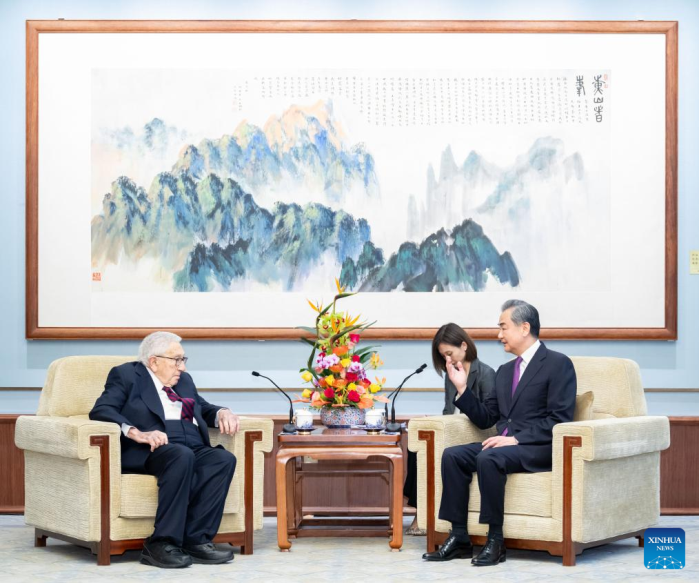By Bradley Blankenship
Former U.S. Secretary of State Henry Kissinger recently arrived in Beijing to hold talks with Chinese State Councilor and Minister of National Defense Li Shangfu and Wang Yi, a member of the Political Bureau of the Communist Party of China (CPC) Central Committee and director of the Office of the Foreign Affairs Commission of the CPC Central Committee, and Chinese President Xi Jinping. He happens to be in town at the same time as another former U.S. Secretary of State, John Kerry, who is the current U.S. climate envoy. Although Kissinger, 100, is a private citizen at this point, it sets up an interesting dichotomy.
For one, Kissinger is widely respected in China and considered a friend to the nation. The former U.S. top diplomat played a key role in helping to normalize relations between Washington and Beijing, engaging in pragmatic dialogue that bridged the two sides. He has routinely traveled to China since leaving his official post and isn't hesitant to diverge from the official U.S. government line, especially now, as relations between the two sides sour. It is important to note that the current meeting was in serious defiance of the current Washington consensus because Li is sanctioned by the U.S. government.
Kissinger was quoted as saying: "The United States and China should eliminate misunderstandings, coexist peacefully, and avoid confrontation. History and practice have continually proved that neither the United States nor China can afford to treat the other as an adversary."
Likewise, a statement from the Chinese said that Beijing has "always been committed to building stable, predictable and constructive Sino-U.S. relations, and we hope that the U.S. will work with China to implement the consensus of the heads of state of the two countries and jointly promote the healthy and stable development of the relationship between the two militaries."
Both of these statements are diplomatic and tempered. This is far and away from the sort of "diplomacy" conducted by high-level U.S. officials today. For instance, U.S. National Security Adviser Jake Sullivan called out China and said the country shouldn't use its developing status to have high carbon dioxide emissions. Even before arriving in Beijing for climate talks, John Kerry said he would not "under any circumstances" support a plan to pay into a fund for poorer countries impacted by climate change – a violation of the COP27 agreement and the 2021 U.S.-China Glasgow joint declaration. But things weren't always this way. A clever observer of the bilateral relationship between these two important countries will note a serious shift in attitude.

Wang Yi, a member of the Political Bureau of the Communist Party of China (CPC) Central Committee and director of the Office of the Foreign Affairs Commission of the CPC Central Committee, meets with former U.S. Secretary of State Henry Kissinger in Beijing, China, July 19, 2023. [Photo/Xinhua]
For more than 30 years since 1979, China–U.S. relations have continued to develop, witnessing rapidly expanding economic and trade exchanges, technological and cultural exchanges, and cooperation on security and major global issues. Most of the friction arising between the two countries was resolved through negotiation.
In 2010, China became the second-largest economy in the world. Since then, the two countries began to drift apart. During former U.S. President Donald Trump's administration, the U.S. declared China as a "strategic rival" and "competitor." China-U.S. bilateral relations took a nosedive with the trade tensions that escalated the conflict.
I also talk to many former U.S. officials, particularly from the administration of former U.S. President George Bush, and these folks are deeply upset with the state of bilateral relations. While I cannot comment on specifics, many of them are working behind the scenes in various capacities to mend ties and bring an end to the mutually destructive downward spiral. It seems that the last several generations of U.S. leaders are essentially trying to clean up the mess from their more immature successors.
However, there has not been any serious change of rhetoric on the other side. When you examine what China today has said about relations with the U.S., nothing has seriously changed: China wants stable and productive relations with Washington. It does not want hostility between the two sides, and Chinese leaders have for decades been careful to avoid this outcome.
One has to admire the work of Henry Kissinger in traveling around the world at such an advanced age with the mission of salvaging the defining diplomatic relationship in today's world. This is even truer when he meets with an individual sanctioned by his government, which is a very bold move for a career U.S. public official. It is to be hoped that successive generations of American leadership will return to the clever pragmatism that defined American diplomacy in the 20th century and that Kissinger's example may resonate with the current American leadership.
Bradley Blankenship, a special commentator on current affairs for CGTN, is a Prague-based American journalist, political analyst, and freelance reporter.

 中文
中文



